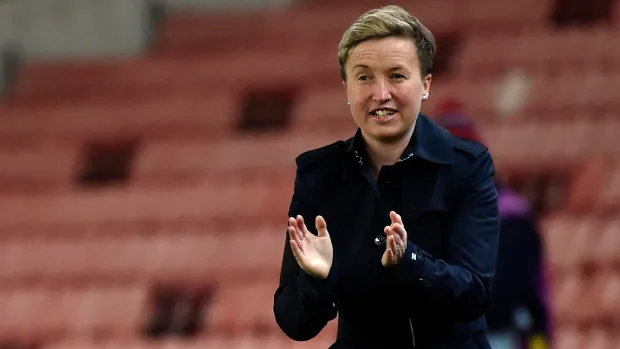
Bev Priestman has already made her mark by coaching the Canadian women’s soccer team to Olympic gold in Tokyo last summer.
Now she wants to deliver an assist off the pitch, by helping raise awareness of autism and the support that exists for parents who are dealing with it.
Priestman’s young son, Jack, was diagnosed with autism in December. Now three and a half, he is getting support and Priestman reports he is happy, healthy and flourishing.
And Priestman is looking to help others as an ambassador for Autism Canada.
“I wanted to use the platform that I have to try and help raise awareness,” the English-born coach said in an interview. “And bring a spotlight to autism and know there’s a lot of support out there. I feel incredibly lucky in Canada that there is this much support. I’m not sure the same is available in the U.K.”
Autism Spectrum Disorder, or autism, is a neurodevelopmental disorder that impacts brain development.
According to Autism Canada, the result is that most individuals experience communication problems, difficulty with social interactions and a tendency to repeat specific patterns of behaviour. They may also have a markedly restricted range of activities and interests.
According to the National ASD Surveillance System 2018 report, an estimated one in 54 children between five and 17 years of age have been diagnosed with ASD. The report is based on 2015 health, education and social services data collected from seven participating provincial and territorial governments representing 40 per cent of children and youth in Canada.
Autism Canada notes those with autism “vary widely in their needs, skills and abilities.”
“There is no standard ‘type’ or ‘typical’ person with an Autism Spectrum Disorder,” it adds.
Milestones, seeking help for support
As such, Priestman is reluctant to talk specifics about her son. Each person is different but she cites “milestones” that may get a parent’s attention.
“His speech was delayed. And really you start to look into that further,” she said.
“I think as a parent you know and you’ve got to trust your gut,” she added. “I’d love for more people to be aware and understand early signs of autism so they can do as we’ve done and get the support that he needs to flourish in life.
“I feel lucky because Jack’s got his own sort of little quirks and all the rest of it, but I feel incredibly lucky that, hopefully with the support that we’ve got for him, he’s going to thrive. He’s high-energy, he keeps us busy.”
He loves going to the park, bouncing on a trampoline and kicking a ball.
But it’s not easy as a parent knowing if such delays in speech or other areas are normal. Priestman and wife Emma Humphries, a former New Zealand international, sought help and are glad they did.
“If people can get these things seen to earlier, you give your kid a massive chance,” she added. “Because you’re getting them the support they need and you know the brain at this age is massively malleable. So I feel incredibly lucky that we got it diagnosed very early.”
Priestman also paid tribute to her wife for taking care of everything while she has been away with Canada.
Autism Canada is happy to add Priestman’s voice to its cause.
“Partnering with Bev, who has a national platform, understands autism and can advocate for our community is an incredible opportunity for our organization,” Barbara Patten, executive director of Autism Canada, said in a statement. “We look forward to working with Bev, supporting her family and to moving the autism cause forward together.”